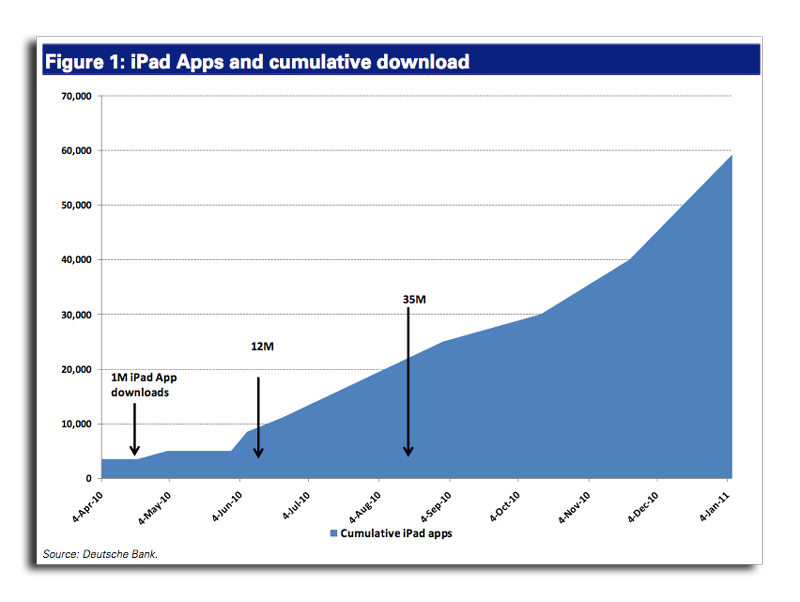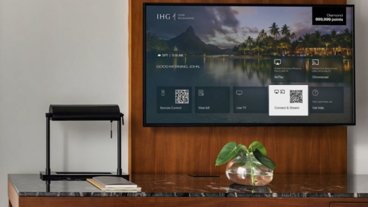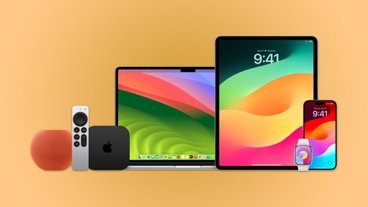Post-CES, Apple's iPad still viewed as tablet leader by Wall Street
With CES now wrapped, analysts who attended said iPad competitors shown off at the Las Vegas convention were unimpressive. Apple is expected to introduce its FaceTime-supporting second-generation iPad in the near future, likely leaving competitors even further behind, they said.
J.P. Morgan
Analyst Mark Moskowitz said he and his team believe Apple will retain more than 60 percent of the tablet market over the next two years, based on the competition spotted at CES. He said hands-on time with a number of devices showed that competitors have a great deal of catching up to do with the iPad.
Moskowitz said tablets he saw were too small and too slow, with the popular 7-inch screen size inferior to Apple's 9.7-inch display, and devices like the BlackBerry PlayBook and some shown off by Intel not as responsive as the iPad.
"in particular, we found the PlayBook to have issues with displaying and scrolling web pages," he wrote. "While these issues could be related to over-used Internet pipes at CES, we believe the browser issues were similar to those in other BlackBerry devices."
Another problem he saw with iPad competitors: there are too many of them. He estimates that more than 40 tablets will appear in the coming months, and while some may be decent, many will fail.
"We believe that Apple's tablet form factor, sturdy operating system, first mover advantage, and apps/content ecosystem should sustain its market dominance beyond the near term," Moskowitz said.
Deutsche Bank
Analyst Chris Whitmore said even after CES, Apple's iPad remains the "gold standard" of touchscreen tablets. He expects to see more than 50 tablets come to market this year, and all of them will be competing for second place.
Whitmore sees about 40 million tablets being shipped in 2011, and he has forecast Apple's iPad will sell around 28 million units, taking roughly 70 percent of the total market.
"We believe the dozens of new tablet entrants will have a difficult time generating meaningful profits due to Apple's enormous cost and branding lead," he said. "We also believe Apple's app lead and tight software-hardware integration provides a significantly better user experience than the devices we saw at CES."
Ticonderoga Securities
The most likely tablets to see a moderate amount of success in 2011 are the BlackBerry PlayBook and Motorola Xoom, in the eyes of analyst Brian White. Still, he saw little that he believes will challenge Apple's lead with the iPad.
"The tablets shown at CES offer certain performance metrics and features not found on the iPad 1," he wrote. "However, we must keep in mind that the specs for iPad 2 have not been announced.
"Also, we still believe the Apple experience with a connected digital ecosystem that extends across devices is superior to the tablets we viewed at the show, while Apple's aesthetics remain well ahead of the pack."
RBC Capital Markets
More bullish on the PlayBook was analyst Mike Abramsky, who said the differentiations in multitasking and performance "may be difficult" for Apple to rival. He expects RIM to expand the PlayBook beyond the 7-inch form factor the company will debut at launch.
"Some aspects of PlayBook (e.g., Apps) are being polished; however, RIM appears determined to get PlayBook right out of the gate, including competitive battery life (via power management from its QNX-based OS)," Abramsky wrote.
Abramsky's take contrasts with another analyst, Shaw Wu of Kaufman Bros., who has suggested that RIM is struggling to fix battery issues with the PlayBook. For its part, RIM has denied any problems in the development of the hardware.
Abramsky believes RIM could even offer some form of virtualization or emulation to allow Android applications to run on the PlayBook. He noted that devices running Google's "Honeycomb" version of the Android operating system do not yet appear "fully baked."
 AppleInsider Staff
AppleInsider Staff











 Wesley Hilliard
Wesley Hilliard
 Andrew Orr
Andrew Orr



 Amber Neely
Amber Neely

 William Gallagher
William Gallagher






